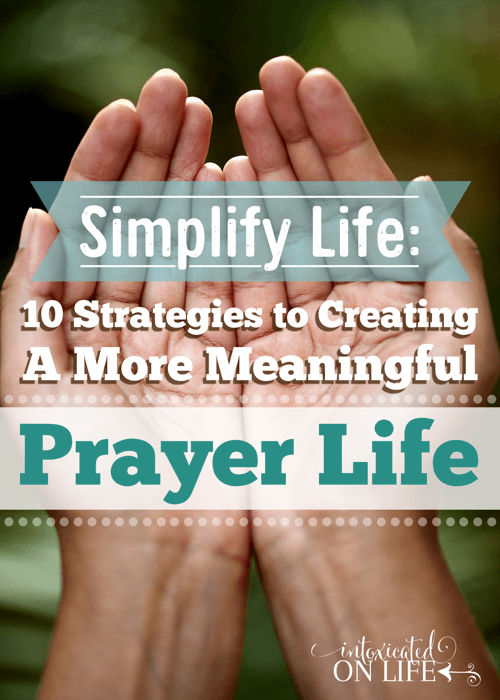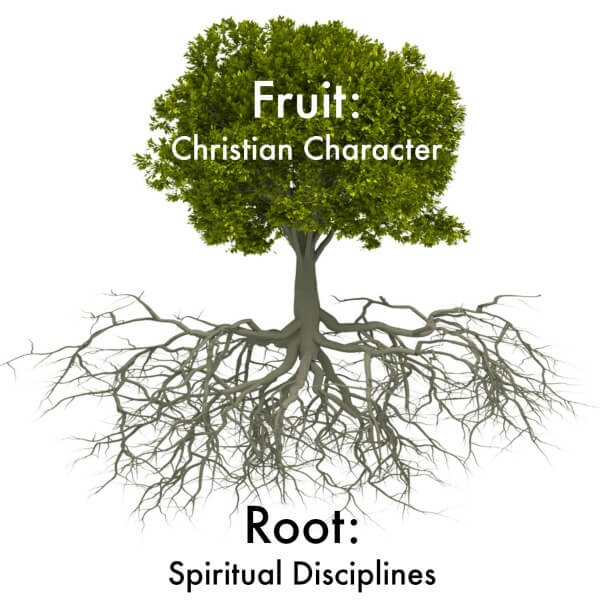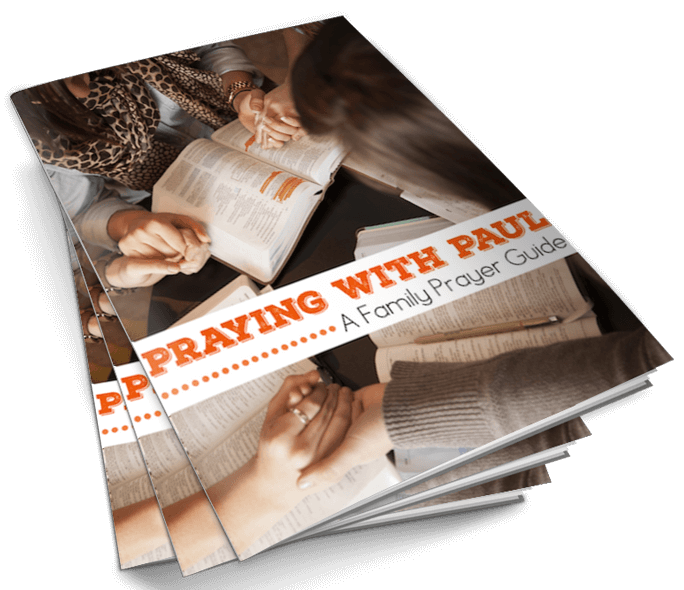As an extrovert and as someone who was in vocational ministry for several years, I’ve gotten pretty good at praying publicly. I know how to plagiarize the Bible just enough to sound holy, but not too much to sound unoriginal. I’ve learned how to keep my prayers short enough to maintain interest, but long enough to sound thoughtful.
Yes, I’ve gotten pretty good at learning how to pray on the street corners with the best of the Pharisees.
But when it comes to praying privately, it’s hard not to feel like a total failure sometimes.
I’ve gone through many seasons of life where personal prayer has been incredibly rich and meaningful. I’ve had other times when it has been all but nonexistent. As I think back on what advice has made the biggest impact on my prayer life, these are my top 10 things I want to pass on to my family—and to you.
1. Know the why: write down your motivations
Those who establish good habits in their lives know what they are aiming for. They know there might be a mundaneness to specific tasks, but if they keep the end goal in mind, they can persevere.
When the Bible speaks of prayer, it speaks of it not just as a duty but a delight, as something that brings incredible blessing. If we are going to be motivated to have a habit of prayer over the long-haul, we need to keep God’s promises about prayer at our fingertips.
Take, for instance, Jesus’ promises about prayer (Matthew 6:6; 26:41; Mark 11:22b-24; Luke 11:9-10; John 14:12-14; 15:7; 16:23-24). Write down these verses and keep the list on hand.
2. Just do it: schedule a time to pray
When you are going from a shallow, infrequent, sporadic life of prayer to something richer and more meaningful, the first—and perhaps biggest—hurdle to get over is the commitment to set aside time daily to do it.
I wish I had something more profound to say about this, but it is the simple step that can’t be ignored. If we want to pray more, we need to be intentional. Yes, you have a dozen excuses for why you don’t do it. You probably always will. Make the choice to change that now.
While any time of day is fine to pray, I believe the morning is ideal. This was the habit of men like Jesus (Mark 1:35), Job (Job 1:5), and many of the psalmists (Psalm 5:3; 57:8; 119:47). Morning prayer calibrates our souls for the day ahead.
Prayer Hack: Know that sacrifices will be made, and that is good. Dedicating time to pray might mean waking up earlier and going to bed earlier. Prayer is important, and so is sleep. Staying up late is not. Set alarms. Set a bunch if you need them. Eventually your body will get used to the new rhythm.
3. Find your sweet spot: pick an undistracting location
Find a location with minimal distractions as your go-to spot for prayer. In time you will learn which objects close to you will help you and which objects will hinder you.
- For some, praying on their bed is ideal. For others, the bed only reminds them of sleep.
- For some, praying with a computer or smartphone is a handy way to keep track of Bible study notes and prayer requests—there are even some handy prayer apps. For others, a phone or computer is just an invitation to check Facebook.
- For some, praying outdoors is a perfect place to connect to God’s created beauty. For others, all they hear are annoying birds, crickets, and mosquitoes.
4. Write it out: journal to organize your pursuit of God
Next to setting aside a daily time to pray, the discipline of keeping a prayer journal has been the most impactful thing on my prayer life.
The man who first inspired my use of a prayer journal is Dean Trune, author of The Path Toward Passion. I’ve known Dean for many years, and he has written in his personal prayer journals nearly every day since November 1, 1988—he says he’s missed only 7 day in the last 25 years.
Dean says that journaling is what allows us to “organize our pursuit of God.” Sometimes journals are organized with tabbed sections, and other times they look more like a chronological diary. Items in a prayer journal can include:
- Written out prayers and praises—like letters to God
- Notes from personal Bible study
- Notes from what God is teaching in times of personal meditation and/or fasting
- Lists of who to pray for and how to pray for them
- Lists of answers to prayer
- Lists of Bible passages being memorized
People journal many different ways, and your specific method isn’t nearly as important as your consistency in doing it. Journals are helpful for several reasons. First, they make us more intentional about our pursuit of God—the very act of pulling out my journal and writing keeps me focused on the discipline of prayer. Second, journals keep track of what we would inevitably forget: answers to prayer, the important truths God is teaching us, insights from His Word, etc.
5. Engage the mind: combine prayer with study
Prayer is a dialogue, not a monologue. As such we need to fill our times of prayer with times where we can sit at the feet of Jesus and learn from His Word.
There are many ways to engage the mind with Bible study. Peter Rhebergen has a list of 12 methods of Bible study that gives a great overview of different approaches, but they basically all boil down to two different methods: book studies (studying a specific book of the Bible verse-by-verse and in its entirety) and topical studies (studying the whole Bible for specific themes as biographical characters, specific words or concepts, etc.).
There’s an important balance to strike here. To some, this might seem like an overly academic exercise, but we must remember that studying the Bible is at the heart of what it means to be a “disciple,” i.e. student, of Jesus Christ. When studied prayerfully, it can be invigorating knowing we are tapping the very mind of God. At the same time, if you are a bookworm like me, it is important to put a cap on Bible study. It is easy for me to spend all my time reading and studying without engaging with God in prayer or quiet reflection.
Prayer Hack: Fill your place of prayer with study helps: concordances, study Bibles, commentaries, Bible dictionaries and handbooks, Old and New Testament surveys, notes from sermons or group Bible studies. You won’t use all of these every day, but they will be on hand for you in case you need them.
6. Engage the heart: combine memorization and meditation
To some the word “meditation” invokes thoughts of Eastern or medieval mysticism, but meditation is something the Bible commands us to do. Christian counselor David Powlison says there are two things that make meditation uniquely Christian: it is full of content (not the emptying the mind of thought but being filled with gospel-centered thought) and it is conversational (not some wordless, emotional experience but speaking and listening to God).
The Hebrew word for “meditate” is hagah, and it means to mutter under the breath or imagine something in the mind. The Bible says the substance of our meditations should be the Word of God itself (Joshua 1:8; Psalm 1:2), the person and character of God (Psalm 35:28; 63:6; 71:24), and the works of God in history (Psalm 77:12; 143:5). Meditation is purposely getting quiet before God and thinking deeply about Him, what He has said, and what He has done.
Prayer Hack: Meditation is particularly beneficial when combined with memorization. Make a list of the Scriptures you want to begin to memorize. Insert this list in your prayer journal. Write out or print out those one or two passages to start. Begin memorizing them in the “down times” of your day. During times of prayer, get quiet before God and slowly recite a passage aloud you are memorizing, pausing to think about specific words or phrases.
7. Engage the body: fast as a means of pursuing God
“Our seasons of fasting and prayer at the Tabernacle have been high days indeed; never has Heaven’s gate stood wider; never have our hearts been nearer the central Glory.” – Charles Spurgeon
Fasting has been practiced among the people of God for centuries as a means of more engaging prayer (2 Samuel 1:11-12; 2 Chronicles 20:1-4; Ezra 8:21-23; Esther 4:15-17; Psalm 25:11-14; Daniel 9:1-19; Joel 2:12-16; Jonah 3:4-10; Luke 2:36-28; Acts 9:9; 13:1-3; 14:23). Traditionally, fasting is going without food, or without specific kinds of food, for a period of time for the purpose of seeking intimacy with God or seeking God for His mercy.
Jesus never commanded us to fast, rather He simply assumed his disciples would do it. In Matthew 6 Jesus teaches us what to do, not if we fast, but when we fast (v.16).
Jesus linked fasting to intimacy with God in prayer. Jesus likened His presence on earth to that of a bridegroom at a wedding feast—His arrival was a time of celebration—but “the days will come when the bridegroom is taken away from them, and then they will fast” (Matthew 9:15). Yes, the Christian life is full of joy, but it is a joy that is merely a foretaste of the joy we will have when Jesus returns. This is why Christians fast today. John Piper explains, “Jesus connects Christian fasting with our longing for the return of the Bridegroom. Therefore, one of the most important meanings of Christian fasting is to express the hunger of our hearts for the coming of our King” (Hunger for God, p.83).
Prayer Hack:
1. Start small. Start with one day of fasting per month. Build up to more frequent times and longer durations.
2. If you have health questions, this series by Dr. Bill Bright is an excellent guide.
3. When you fast, use your prayer journal to note: (a) the purpose of your fast (what you are praying for and about); (b) the planned duration of your fast; (c) the limitations of your fast (what you will and will not ingest); and (d) your experiences during the fast.
8. Engage the passions: praise God and be happy in Him
Dean Trune often teaches about developing a “spiritual root system.”
Spiritual disciplines include a lot of what we’ve been talking about so far: studying the Word, meditating on and memorizing the Word, listening to God, fasting, devoted times for prayer, etc. These are the roots of our life in God, but they are all connected to a “tap root,” which is a passion for God.
Closely connected to this tap root is the discipline of personal worship. This is what George Müller called his “first and primary business” every day: “to have my soul happy in the Lord.” What does this look like? First and foremost, it means your disciplines of study, reading, meditating, journaling, and intercession should lead to finding happiness in God. If we are rushed and hurried through our devotions, we must slow down and let ourselves find joy in our thoughts of all God is.
Prayer Hack: If this seems unnatural to you, take some cues from the psalms. In your journal or out loud, boast about the good things God has done for you and for others (Psalm 34:2). Sing worship songs aloud (57:9). Lift up your hands as you pray to show an attitude of receptivity and thankfulness (63:1). Kneel down as you pray to show an attitude of humility (95:6).
9. Get away: take personal retreat days to reflect
At one point, I was in the habit of taking a monthly “retreat day” (influenced, again, by Dean Trune). This involved taking a day or half a day an going away to a remote location to be alone with God.
My agenda every retreat day was pretty simple: I would read through a month’s worth of journal entries, taking notes about patterns that I saw. Inevitably, there would always be some theme God was teaching me in any given month. Often, these retreat day notes would guide my prayers in the following months.
If you’re a parent of young kids, a retreat day might sound impossible. As an alternative, have your spouse watch the kids for 3-4 hours. Instead of doing it every month, do it every 6 week or every 8 weeks.
10. Get inspired: use Scriptural prayers for intercession
The weakest area of my personal prayer life has always been intercession: remembering who to pray for and what to pray about.
Who to pray for…
I recommend using a “concentric circle” model when you pray (like John Piper talks about):
- The central circle is your own soul: Pray that God will sanctify and change your heart. Pray through your own anxieties and troubles. Confess your own sins to God.
- The next concentric circle is your family.
- The next concentric circle could be members of your church.
- The next circle might be specific unbelievers.
You can continue the circles to include missionaries, government officials, good friends, etc. The general idea is that the closer to the center you get, the more often you pray for that person or situation.
(If you want a handy app to help you stay organized, PrayerMate is a great free one.)
How to pray for them…
The best way I know to offer my requests to God is to use Scriptural prayers when interceding for myself or others.
If I was asked to name my top 3 books on prayer, among them I would definitely include D.A. Carson’s A Call to Spiritual Reformation. In this book he analyzes the prayers of the apostle Paul, showing the thought and meaning behind each one.
Prayer Hack: Carson’s inspired me to write a family prayer guide a few months ago based on Paul’s prayers. I call is Praying with Paul. Each prayer in the book is based on a section of one of Paul’s letters where he writes about how he prays for his disciples. Get it now in our store!













Thanks for putting this list together. My children are getting old enough that my life is more scheduled and I’ve noticed more regularity in my prayer life. It feels so good to start my morning with prayer and Bible reading.
You’re welcome! Hope this continues to help you throughout your life as it does me.
I just discover this article, in the moment that i have been talking with my husband about how to improve our prayer and spiritual life in a ptactical way. Thank you Luke, the Lord used you to bless our lifes. By the way I’m reading you from Temuco in the south of Chile!!
Greetings from the U.S. Thanks for reading! Glad it helped you!
Thanks for this list. I definitely needed some more structure and discipline for my prayer life and I didn’t know where to start. God bless.
Glad you found this helpful!
My husband and i were just discussing this very topic including fasting last night. This article is so timely. I will be sharing it with my husband and teens tomorrow. I am eager to check out your book too. As always I am sure it will be a blessing to our family.
Thanks for sharing this!
5 and 6 definitely, and I combine 4 with 10 (I write down the Scriptures to pray in my prayer journal.
What helped me to “just do it” (No. 2), however, is seeing a principle from Mat 17:14-21. Jesus cites unbelief as the reason the disciples could not cast the devil out, then states, “Howbeit this kind goeth not out but by prayer and fasting.”
That tells me that if I have faith, I will pray, and, conversely, that prayerlessness is a symptom of faitlessness. The Word is a mirror, and so when I saw this it was transformative, not condemning. It became: I have faith, therefore I pray.
Thanks I really needed this to help me move into prayer with my kids.
I have really been helped.. God bless you for this insipiring article
Thanks for the comment!